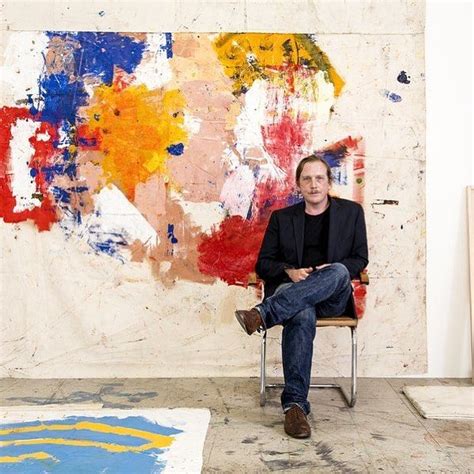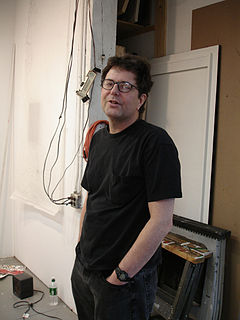Цитата Джима Роу
Нарисуйте маленькую картину того, что вы хотите сделать... и спроецируйте ее на белую стену... Увеличенная версия настолько изменена, что нет возможности просто визуализировать ее в мозгу... Это совершенно новое измерение. в живописи.
Связанные цитаты
Что ж, живопись сегодня, безусловно, кажется очень яркой, очень живой, очень захватывающей. Пятеро или шестеро моих современников в Нью-Йорке делают очень важную работу, и направление, которое живопись, кажется, принимает здесь — это — от мольберта — к какой-то, какой-то настенной, настенной живописи.
Я думаю, что хорошая картина или хорошее произведение искусства делают много вещей, которых хотят, я имею в виду, может быть, 15, или 20, или 100. Одна из вещей, которую делает картина, - это украшать комнату. Он улучшает стену, на которой стоит. Что намного сложнее, чем кажется. И это хорошо. И если кто-то занимается картиной на таком уровне, это прекрасно, это здорово. Через какое-то время знакомство, другие вещи, которые делает картина, другие слои, они просто начинают давать о себе знать.
Многое из того, что я делаю, связано с тем, чтобы быть в данный момент, и я думаю, что людям трудно это понять. Мне нравится, когда что-то внезапно влияет на картину. Я смешиваю это красное, и это влияет на всю картину, или немного белого падает туда, и что-то меняет всю природу вещи. Остаток от того, что происходит, это то, что есть на картинах.
Картина всегда делается в сотрудничестве с [моделью]. Проблема с изображением обнаженной натуры, конечно же, в том, что это углубляет трансакцию. Вы можете выбросить картину с изображением чьего-то лица, и это повредит самооценке натурщика меньше, чем выбрасывание картины с изображением всего обнаженного тела.
Вся эта чепуха о плоскостности — это идея о том, что живопись — это специализированная дисциплина и что модернистская живопись все больше обращается к живописи и совершенствует законы живописи. Но кого волнует живопись? Что нас волнует, так это то, что планета нагревается, виды исчезают, идет война, красивые девушки здесь, в Бруклине, на проспекте, еда и цветы.
Написание пьес дало мне все, чего не дала живопись, а именно способность рассказывать истории в реальном времени, в реальном пространстве, в трех измерениях, во плоти и крови. Я понял, что пытался втиснуть все это повествование в свои картины, но, в конечном счете, живопись была статичным средством. Так что это просто открыло эту совершенно новую дверь.
Не знаю, но книга в человеческом мозгу лучше, чем книга в переплете из голени, -- во всяком случае, она безопаснее от критики. А снятие книги с мозга сродни щекотливому и опасному делу снятия старой картины с доски — нужно соскоблить весь мозг, чтобы добраться до него с должной безопасностью, — и даже в этом случае рисование может не стоить хлопот.
В изобразительном искусстве, когда вы делаете картину, это просто картина. Но если вы рисуете картину в индустрии развлечений, это может быть обложка альбома, футболка или логотип. Мне нравится, что у развлечения есть такая польза — в конечном счете, оно пытается заставить группу людей что-то почувствовать, подумать о жизни и иметь возможность использовать вещи, которые были такими простыми и прямыми, но потенциально имели действительно мощный эффект.































